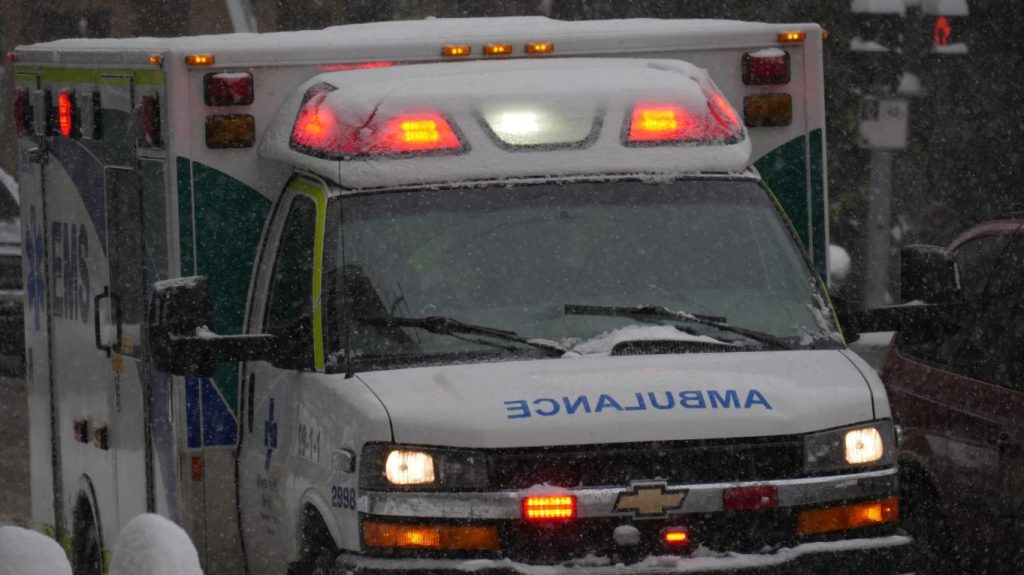‘Demoralizing’ and ‘draconian:’ reactions pour in over Alberta’s new transgender policies
Posted Feb 1, 2024 10:21 am.
Last Updated Feb 2, 2024 9:14 am.
Alberta’s new policies affecting transgender people, announced Wednesday, are being called the most restrictive rules against transgender people in all of Canada, and there has certainly been a lot of reaction online.
Alberta Premier Danielle Smith calls these new policies a way to support children and teens as they grow into adults.
In a seven-minute video posted to social media, Smith outlined a serious of transgender policies and guidelines ranging from restrictions on hormone therapy and surgery, to participation in sport.
“I strongly believe that we as a society must support and reach out with kindness and inclusion to those who identify as transgender and work to eliminate the discrimination that they often experience in their lives,” she said.
Smith said the announcement comes following discussions with her United Conservative Party (UCP) caucus.
Gender identity can be a hard thing to talk about, especially when you are involved. But this conversation is extremely important and parental involvement is critical. Kids need to know we love and support them.
My message to all Albertans: pic.twitter.com/i0ii57GLa6— Danielle Smith (@ABDanielleSmith) January 31, 2024
When it comes to education, the premier said the province will require parental consent for students 15 and under who want to change their names or pronouns at school, and added that students 16 and 17-years-old won’t need consent, but their parents will have to be notified.
Parents must also opt-in for their kids to participate in each class that teach about sex education, sexual orientation, or gender identity.
Current laws allow parents to opt-out of such education.
Gender reassignment surgery will also be banned for those 17-and-under, the premier said, and minors won’t have access to puberty blockers and hormone therapies for gender reassignment or gender affirmation.
For transgender adults, Smith says her government is putting together a private registry of doctors and medical professionals who specialize in transgender surgery, which she says will better support the lifelong health care needs of transgender Albertans, including access to needed hormones and surgery aftercare.
“As premier of this province I want every Albertan that identifies as transgender to know I care deeply about you and I accept you as you are,” she said. “As long as I lead this province I will ensure you are supported and your rights are protected.”
WATCH: Parents react to Alberta’s proposed gender identity policies
READ MORE: Alberta to require parental consent for name, pronoun changes at school
Smith’s policy also seeks to exclude transgender athletes from competing in women’s sports.
“Similarly, the risks and unfair advantages that young women and girls are experiencing when competing with biologically stronger females in sporting competitions, have also grown too high,” she said.
But the measures are being called “draconian” by some politicians and associations, with measures going further than what many had expected.
In an open letter, Calgary’s Mayor Jyoti Gondek, called the policy an infringement on human rights.
1/The proposed gender identity legislation announced by the provincial government today is an infringement on human rights, including the rights of trans kids and supportive parents who are navigating a difficult journey.
— Jyoti Gondek (@JyotiGondek) February 1, 2024
NDP leader Rachel Notley said it’s important to stand shoulder-to-shoulder against hate.
Friends, I want to speak directly to the two spirit and trans Albertans feeling scared today.
We will have more to say tomorrow, but I want you to know right now that you are loved, and you are welcome. There are many Albertans standing shoulder-to-shoulder with you against…
— Rachel Notley (@RachelNotley) January 31, 2024
In a press conference Thursday, Notley strongly opposed the new policies the UCP has committed to, saying Smith is “playing dangerous politics with the lives of young people.
Former Mayor Naheed Nenshi says it’s important to never stop fighting for trans people.
She wants us to depoliticize this, so I will try:
To all kids in Alberta, I know this is scary. Please know that there are people in your lives who love and respect you, who want the best for you.
We will never ever stop fighting for you and for your dignity. And we will win.
— Naheed Nenshi (@nenshi) February 1, 2024
President of the Alberta Federation of Labour, Gil McGowan, called it a “demoralizing day” to be an Albertan.
Today, it’s demoralizing to be an Albertan. Tomorrow may be worse. But, as the leader of a large, province-wide organization, I know there are millions of us who don’t agree with the direction Danielle Smith and the UCP are taking our province.
— Gil McGowan (@gilmcgowan) February 1, 2024
There is no shortage of doctors and professors reacting either — the Canadian Research Chair for the Public Understanding of Sexual and Gender Minority Youth at MacEwan University, Dr. Kristopher Wells, calls these new rules the most far-reaching in Canadian history.
“The changes announced, they’re shocking, they’re unprecedented, and they are very punitive,” he said. “These changes are not going to help youth, they’re going hurt them — and in some cases — may lead them to take their own lives, that is how serious these charges are.”
Dr. Corinne Mason from Mount Royal University, says there are already lots of moving parts.
“Two or more places that trans communities are going to go — one: we’re taking to the streets on Saturday and so there will be multiple rallies in Calgary and Edmonton,” they said. “The other place that trans communities are going to go is to the court system.
“There’s already legal challenges pending, once those policies are released, there’s an organization who is ready to meet Danielle Smith’s UCP in court.”
Mason adds that members of the community will support each other throughout the process.
“We’re a very strong community, so we’ll be looking to create pathways to care for one another in addition to fighting these draconian laws,” they said.
Constitutional law expert Eric Adams adds not only could there be grounds for a charter case over discrimination, but the law does recognize a mature minor those around the ages of 16 and 17, and changes to medical rules and procedures could come with their own legal challenges. As well as new rules for the province’s educators.
“The fact that she’s telling her friends that she is a she, and the school has to immediately have to tell that persons parents if they hear that school yard conversation. If there’s evidence that puts that individual at some risk, then there can be a constitutional challenge,” explained Adams.
WATCH: Experts expect legal challenges over Alberta’s new gender identity policy
Speaking to media Thursday, Smith says while the province’s lawyers will have to deal with the legalities, she believes the constitution is on her side.
“There has been legal jurisprudence around mature minors, so I’m sure there’s a case law that can be drawn on this. It’s fairly rare to be established as a mature minor, so I think we do rely on parents to be able to provide for their kids,” said Smith.
A national advocacy group representing LGBTQ2S+ individuals disagrees and has vowed to take legal action against the province. while details around Alberta’s new gender identity policies are being revealed, saying precedent is on their side.
“These policies — and I can go into details — violate the rights of gender diverse young people to equality and security of the person, because they cause such severe harm,” said Bennett Jensen, the director of legal, at EGALE Canada.
In the premier’s video, which was released on Facebook and Twitter, as many people denounced the announcement, many applauded it, cheering on the premier in what they called “a common sense approach.”
Wells says the new policies are the furthest thing from common sense and feels that this could have a huge impact for years to come.
“By no means is this at all the end of the conversation — if Danielle Smith wanted to start an ideological war, well, she’s well on her way to doing so,” he said.
“This will have far-reaching and wide ramifications,” he said. “These kinds of policies are not designed to just restrict the rights of LGBTQ+ people, they are designed to erase them from existence in our society.”
Some answers to questions will likely become clearer Thursday, as Smith is expected to address the highly controversial decision in a news conference starting at 1:30 p.m. in Calgary.
“We’re a very strong community, so we’ll be looking to create pathways to care for one another in addition to fighting these draconian laws,” Mason said.
The Alberta Medical Association, hosting a virtual press conference regarding family physicians on Thursday, said they were not yet willing to comment on the proposed health policies.
WATCH: Medical experts react to Alberta’s proposed changes to transgender care
But the Canadian Medical Association did weigh in, posting on social media “Gender identity is a health issue and every step should be taken to ensure that all children and youth achieve optimal health.”
Pointing to a previous statement they released, saying “safe environments in which children and youth can express themselves, absent of barriers, prejudice, and restrictive conditions that can lead to harm and stigma.”
Federal politicians are also weighing in on the issue.
Minister of Health Mark Holland said he is “deeply disturbed” and that the decision made by Alberta puts kids at risk.
“I’m going to be meeting with Adriana LeGrange,” he added. “My first priority is to try through communicating and I’ll be in Alberta very soon to have that face to face meeting, that’s the first step.”
Arif Virani, the federal justice minister, also voiced his concerns, saying parents need to be able to have these conversations with their kids, but sometimes don’t feel empowered to do so.
“That’s a small amount of children around the country and even smaller amount in Alberta,” he said. “I think actually targeting that small minority for some political purpose in Alberta, as it seems that the Premier is doing is not becoming of her office, and is in fact actually targeting and perhaps even demonizing those children.”
Minister for Diversity Marci Ien says she spent the night on the phone consoling trans youth in Alberta and speaking with advocates.
“I’ve got two kids, we’ve have a great relationship, that’s not the case everywhere else. To focus in on the most vulnerable segment of our society is reprehensible,” she said Thursday.
Alberta’s move comes months after Saskatchewan’s government also spear-headed so-called “parental rights” legislation.
A bill was given final approval in the province’s legislature in mid-October, preventing children under 16 from changing their names or pronouns at school without parental consent. It uses the notwithstanding clause to override sections of the Charter of Rights and Freedoms and Saskatchewan’s Human Rights Code.
In June, New Brunswick Premier Blaine Higgs announced a review of an educational policy that had made it mandatory for teachers to use a student’s preferred pronouns and names at school. After the review, the government said teachers must get the consent of a parent to use different names or pronouns for students under 16.
-With files from Adrienne South, Cormac Mac Sweeney, Darcy Ropchan, and The Canadian Press.










